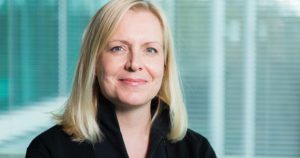Debbie Green begins by telling a story: “A father sees his son injured playing rugby and hands him over to paramedics, who rush him to a hospital. On getting to the operating theatre, the surgeon stops and says, ‘I shouldn’t be operating on this child – he’s my son.’”
As she points out, it’s likely more than a few people will be confused until they realize that the surgeon is the boy’s mother. It was an article she published to LinkedIn in honor of International Women’s Day and Green uses this exemplum to set the stage for her own conversation about how unconscious bias can easily filter into some workplace cultures.
Green is Oracle’s vice president of applications, UKI, and with the exception of a brief foray with a rival Silicon Valley cloud-based company, Green has been a staunch employee of Larry Ellison’s multi-billion-dollar corporate force for the last two decades. It was the experiences she had with the competing software firm that reinforced her loyalty to Oracle’s sales-driven purity of spirit, she says.
To illustrate her point about the problem with unchallenged gender assumptions, the VP shared an exchange she had with a supervisor from said cloud-based company: “I asked my manager for funds to set up a group – an informal forum where women could discuss their careers. His response went something like this: ‘What do you need that for? You’re invited to come out with the men after work. You’re segregating.”
Needless to say, Green didn’t stay long – seven months to be exact. From there, her rise from sales director up through Oracle’s ranks to vice president took a little over five years. The great gender equalizer, she believes, is the company’s fierce dedication to making the deal. As it turns out, being able to find her own way of making it happen works just fine for the UK-based executive – and the billion-dollar software giant.
“[It] doesn’t mean gender is irrelevant,” Green shared. “I am a valuable resource – but one who is first and foremost an individual, but also a mother, wife, daughter, etc. – who needs flexibility to deliver. If I get results, I’m allowed to get on with it.”
On the topic of Oracle’s evolution into a more consumer-facing company, Green has much to say. Like many legacy corporations, the SaaS movement has had a significant impact on Oracle’s culture and customer approach. Green makes her own wry observation about how the ‘service’ aspect of the subscription-based model has affected the order of things.
“It’s a different era. When I think about historic projects where the customer would buy a bit of software through an SI and the SI would implement it, they didn’t even want us around the table at the project boards: ‘Oh go away, bugger off, we’re dealing with the SI; nothing to see here’. Now people are realizing they need us around the table: it’s not just software, it’s a service. Customers often want to interact with us directly.”
Twenty years ago, she oversaw user satisfaction for Oracle’s entire roster of public sector clients (pre-2000). Now, there is a whole department dedicated solely to “customer success” and the connection between the development team and Oracle’s clients are closer than ever. Advising and adjusting are a continuous and fluid process now that helps inform Oracle’s direction.
“It had to happen with SaaS. [Developers] realized they need to be in touch,” she said. “They’re very accessible, happy to talk, jump on calls with customers. I’ve seen new functionalities put in within months when customers want them: it’s much, much faster. There’s still a lot to learn about how to deal with people in this new cloud word: it’s a service culture.”
























